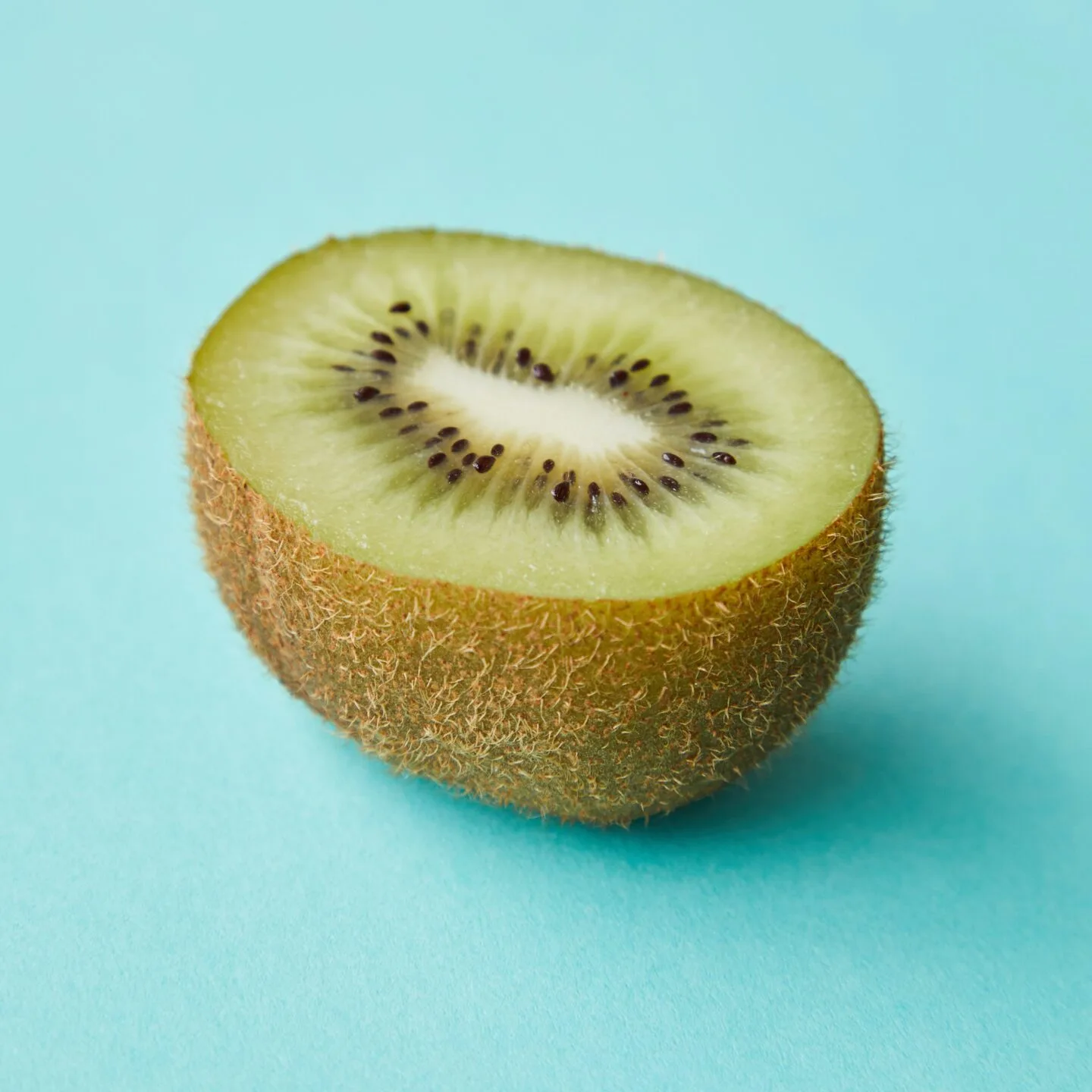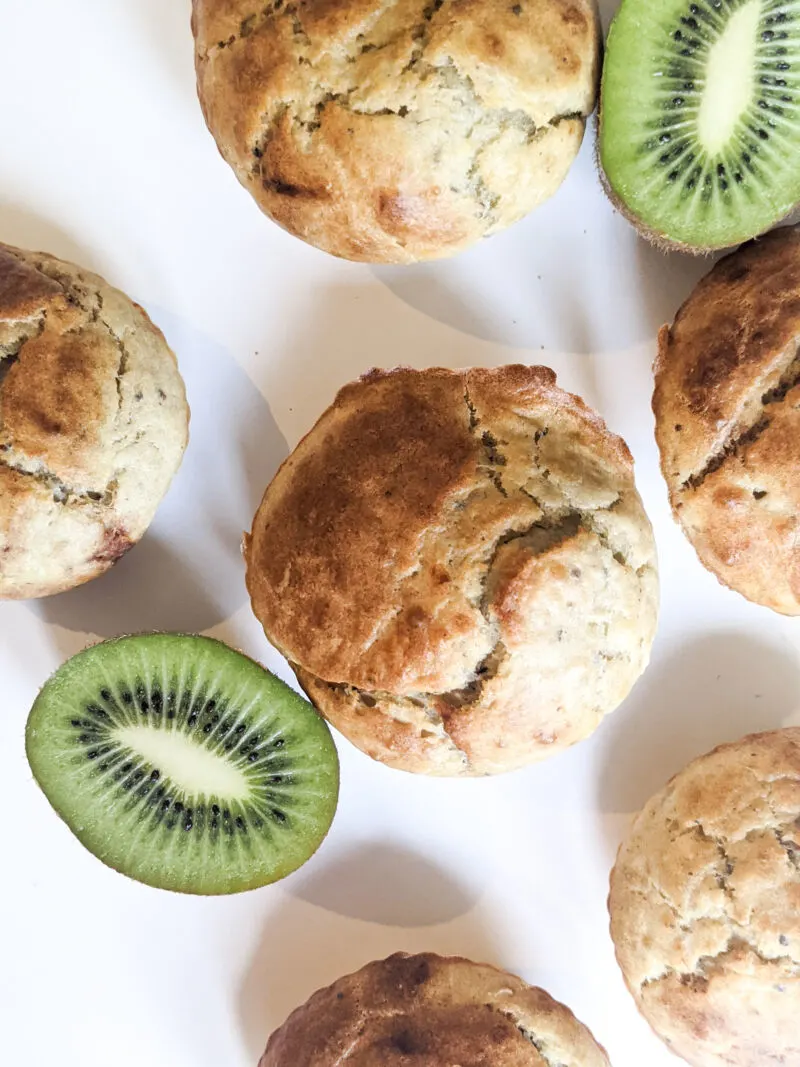As your baby grows and explores the world of solid foods, you might be wondering about introducing them to a variety of fruits. Kiwi, with its vibrant green flesh and sweet-tart flavour, might catch your attention. But can babies eat kiwi?
The answer is, yes, they can, however, there are a few things you need to know before offering this delicious fresh fruit to your little one.
So let’s dive into the world of this exotic fruit to explore its suitability for your baby’s diet as well as uncovering some fun ways to offer kiwi fruit to your baby.

Can Babies Eat Kiwi? Yes, but here’s what you need to know.
The answer is yes to the question ‘can babies eat kiwi?’, but there are a few considerations to keep in mind. Kiwi is generally safe for babies who are around 6 to 8 months old and have started eating solid foods. Before offering kiwi to your little one, take a look at the following points:
- The benefits of feeding your baby kiwi
- Are there any potential hazards involved with feeding your baby kiwi?
- Can babies eat the seeds in kiwi?
- How to feed kiwi to your baby
Let’s take a look at each of these points in turn.

The Benefits of Kiwi for Babies
Not only can babies eat kiwi, but it is a fresh fruit that is nutrient-rich and offers several health benefits that are extremely advantageous for babies.
Firstly, kiwi is loaded with vitamin C, which is renowned for boosting the immune system and aiding in the absorption of iron from other foods. These two powers that vitamin C offers are one of the great things about kiwi. This combination helps babies to build their defences against infections and colds, as well as ensuring they have the necessary iron levels to support neurological development during infancy.
Secondly, kiwi is known to help aid digestion thanks to the natural enzymes that are present, such as actinidin. These enzymes are responsible for promoting healthy gut health which is vital for babies as they transition onto solid foods. Additionally, kiwi is a great source of fibre which helps babies to regulate their bowel movements and also helps to support their overall digestive health, along with the enzymes.
Kiwi is also absolutely packed full of antioxidants that help to protect cells from damage and contribute to the overall health and well-being of your baby.
Finally, kiwi provides essential nutrients and minerals like vitamin K, vitamin E, potassium, and folate, which are vital for your baby’s growth and development.

Are there any potential hazards involved with feeding your baby kiwi?
Many parents want to know, can babies eat kiwi straight away? As long as your baby is around the 6 month mark and is transitioning well onto solid foods, it should be fine to offer them fresh kiwi. However, whilst kiwi is generally safe for babies, there are a couple of potential concerns to be aware of:
Allergies: Kiwi belongs to the list of common allergenic foods, along with other fruits like strawberries and citrus. Always introduce kiwi in small quantities and watch for any allergic reactions such as rash, hives, or difficulty breathing. If you notice more than one common allergy symptom occurring at the same time, call your emergency services as soon as possible. The same applies if you notice your baby is having difficulty breathing or has lost consciousness.
Acidity: The high acidity levels in kiwi may cause some irritation in the mouth, as well as nappy rash in sensitive babies. If you notice any signs of discomfort, consult your child’s GP or health visitor before reintroducing kiwi into their diet.

Can babies eat the seeds in kiwi?
When it comes to serving kiwi to your little one, you might be wondering ‘can babies eat kiwi seeds?’. Whilst the seeds themselves are not toxic or harmful, they do pose a potential choking hazard for babies that are just starting out on their baby-led weaning journey. This leads us to our next section.
How to feed kiwi to your baby.
Knowing the answer to ‘can babies eat kiwi?’ is only the first step in introducing this fruit to your baby’s diet. You also need to know how to prepare kiwi in a safe way in order to offer it to your baby.
Firstly, you need to remove the skin of the kiwi – no one wants to eat that! It’s recommended by the NHS that you blend kiwis into a puree or mash for your baby to eat. This same advice goes for all fruits – especially for harder fruits that will need to be cooked first in order to soften them up, like apples).
Babies and young children have a higher risk of choking on small, hard objects, and the seeds in kiwi can be difficult for them to manage at first. To ensure that your baby doesn’t choke, you can scoop the seeds out before offering the kiwi to your baby, or you can put all the flesh, including the seeds, into a blender and strain to ensure that the kiwi is of a smooth consistency.
Not all babies will require the seeds to be removed, after all, they are very small and all babies tolerate varying textures differently. But if you do notice your baby struggling, removing them is certainly an option. Once your baby is ready, you can peel and offer kiwi as finger food.

How To Feed Your Baby Kiwi
If you’re looking for some recipe or meal inspiration, there are plenty of fun and delicious ways to introduce kiwi to your baby’s diet. Personally, we love this banana and kiwi muffins recipe, serving kiwi in fruit salads, serving them on top of pancakes with blueberries or strawberries, or serving them alongside yoghurt.
Additional tips for feeding your baby kiwi.
Instead of asking can babies eat kiwi?, try asking how to serve kiwi to my baby?
When introducing kiwi to your baby, follow these steps to ensure a safe and enjoyable experience:
- Choose Ripe Kiwis: Opt for ripe kiwis that squish slightly when gently squeezed. Avoid overripe kiwis, as they might be too soft and mushy for your baby.
- Peel and Mash: Start by peeling the kiwi and mashing the flesh to a smooth consistency. You can use a fork or a baby food processor for this.
- Mix with Other Foods: Consider mixing mashed kiwi with other familiar fruits or vegetables that your baby has already tried to help them get used to the taste.
- Observe for Allergic Reactions: After serving a small amount of kiwi, monitor your baby for any allergic reactions for at least a couple of days before offering it again.

Can babies eat kiwi fruit?
We’ve answered the commonly asked question, ‘can babies eat kiwi?’ and provided a comprehensive list of health benefits, as well as discussed the potential hazards associated with eating kiwi.
Kiwi is loaded with antioxidants and nutrients that are extremely advantageous for developing babies, however, the sour or bitter taste of kiwi isn’t always liked by young children at first.
For this reason, it’s a good idea to learn how to serve kiwi to your children, including how to best prepare it for your baby, and also how to incorporate it into your baby’s diet with some tasty meals and baked treats.
